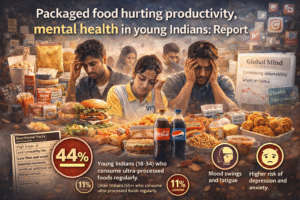In an age where scrolling through social media has become second nature, the CEO of Perplexity AI has struck a chord with a powerful message for today’s youth: spend less time on Instagram, and more on expanding your knowledge base.
In a recent interaction, Perplexity CEO Aravind Srinivas highlighted a growing concern about how young minds are investing their time online. While platforms like Instagram offer entertainment and social connection, he warned that excessive use may be replacing opportunities for real learning and intellectual growth.
AI Tools vs. Social Media: The Battle for Attention
Srinivas’s remarks come amid concerns over the increasing influence of platforms like Instagram on the habits and productivity of young people. While social media offers entertainment and connection, he argues that excessive scrolling offers little in terms of career advancement.
“People who really are at the frontier of using AIs [systems] are going to be way more employable than people who are not,” Srinivas stated. “That’s guaranteed to happen.”
His warning is clear: those who fail to upskill with AI technology risk falling behind in an evolving job market. Mastering AI will no longer be a bonus — it will be a necessity.
The Rapid Pace of AI: A Test of Human Adaptability
The Perplexity CEO also highlighted a major challenge — keeping pace with rapid AI evolution. “The human race has never been extremely fast at adapting,” he said, adding that new AI systems are released every three to six months, stretching the limits of how fast individuals and organizations can keep up.
Srinivas’s insights echo recent warnings from other AI pioneers. Geoffrey Hinton, often dubbed the “Godfather of AI,” has cautioned that artificial intelligence could replace millions in white-collar roles, especially in “mundane intellectual labor.” Similarly, Dario Amodei, CEO of Anthropic, predicted that AI could eliminate 50% of white-collar entry-level jobs within the next five years.
Reimagining Employment: Entrepreneurs Take the Lead
While acknowledging that job displacement is inevitable, Srinivas remains optimistic. He sees entrepreneurship as the key to creating new opportunities in the age of AI.
“Either the people who lose jobs end up starting companies themselves and make use of AIs, or they end up learning the AIs and contributing to new companies,” he explained.
In this vision, young people aren’t just passive victims of disruption — they’re agents of change, building startups and innovations powered by AI.
A Broader Industry Outlook: Transformation, Not Just Displacement
While the risks of job losses are real, some tech leaders like Nvidia CEO Jensen Huang maintain a more balanced perspective. Huang believes that AI won’t necessarily eliminate jobs but transform them, creating new roles that require human creativity, emotional intelligence, and strategic oversight.
Still, the consensus is clear: familiarity with AI tools will be a core skill for future workers, just like using the internet or spreadsheets was in previous decades.












More Stories
Solar stocks crash: Waaree Energies slumps over 14%, Premier Energies down 12% as US tariffs bite
Sam Altman plays down AI water-use claims, says energy is the real issue
‘Safety-first’ mindset accelerates transition of high-end technologies in mass-market vehicles: Techarc report